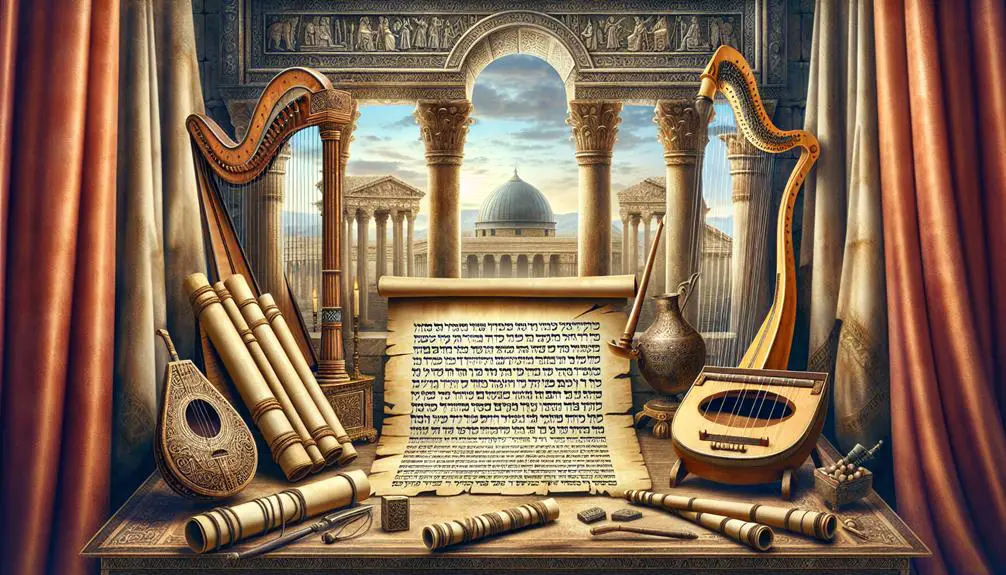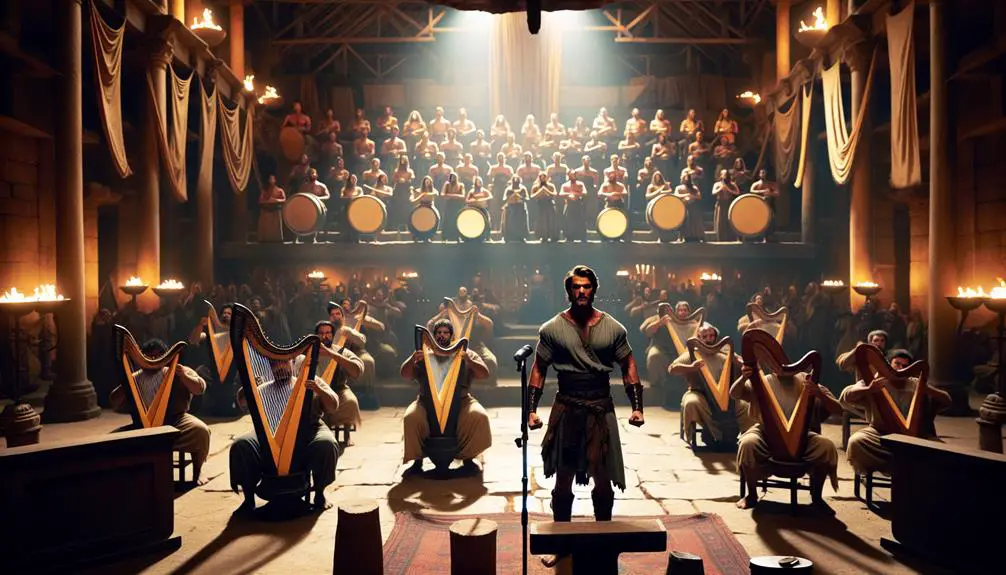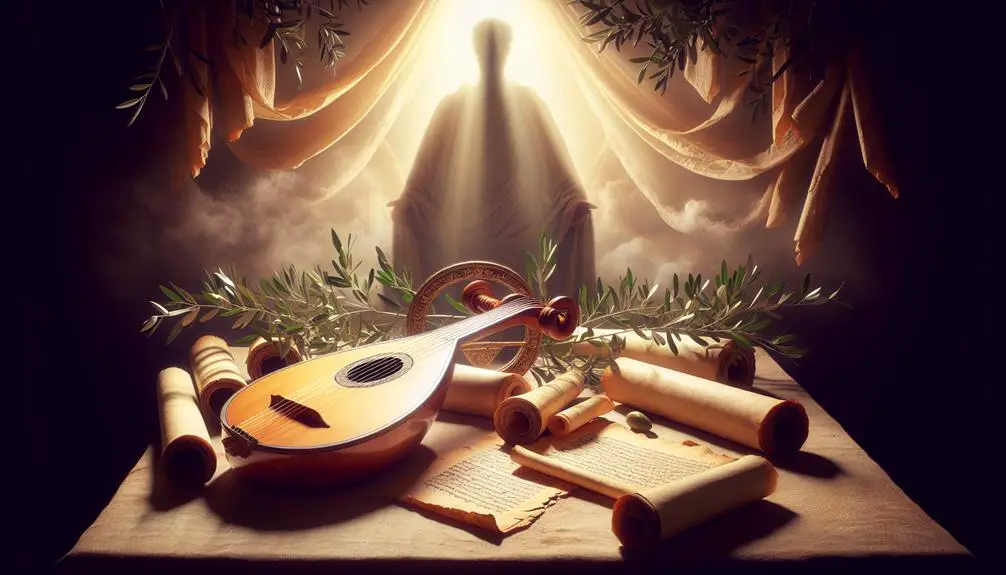Yearning to understand biblical worship? Discover Heman's profound influence on music and devotion, and why his legacy still echoes today.

Heman in the Bible
In the vast ocean of biblical figures, Heman stands as a beacon of musical and spiritual dedication, guiding those who seek to understand the depths of worship and praise in ancient times.
As you explore his historical background, you'll discover the pivotal role he played in shaping the musical traditions of worship, particularly through his contributions to the Psalms.
Heman's legacy, interwoven with spiritual lessons and his influence on music, offers a rich tapestry for anyone interested in the resonance of faith through generations.
The intricacies of his life and works hold keys to unlocking broader themes of devotion and creativity, inviting you on a journey to uncover the echoes of his impact that still reverberate today.
Key Takeaways
- Heman was a Levite musician who played a pivotal role in integrating music into biblical worship and Psalms.
- He contributed to the development of liturgical music, emphasizing the use of instruments and vocal techniques in worship settings.
- His legacy in music and psalmody showcases the emotional and spiritual power of music to transcend generations.
- Heman's life and contributions to the Psalms encourage believers to express faith and hope through music, even in times of struggle.
Historical Background of Heman

Delving into the historical background of Heman, it's crucial to note that he was a prominent figure in the Hebrew Bible, recognized chiefly for his exceptional musical and poetic talents. When examining Heman's lineage, you uncover a rich tapestry of genealogical significance that sheds light on his esteemed position within the biblical narrative. As a descendant of Levi, Heman's heritage is intrinsically linked to the Levitical priesthood, a lineage that was bestowed with the unique responsibility of managing the religious and musical aspects of the temple service. This genealogical backdrop isn't merely a testament to Heman's familial roots but highlights the pivotal role his lineage played in shaping his identity and vocation.
The genealogical records, as chronicled in the Scriptures, meticulously detail Heman's ancestry, tracing his lineage back to Kohath, one of Levi's sons. This connection isn't only genealogical but also symbolizes the continuation of a sacred tradition, emphasizing the profound spiritual and cultural legacy inherited by Heman. The significance of Heman's lineage is further amplified when considering his designation as a 'singer' and a 'seer,' roles that were profoundly influenced by his Levitical heritage. Such titles weren't merely honorific but were indicative of Heman's integral role within the spiritual and liturgical life of his community.
In scrutinizing Heman's genealogical significance, you grasp the depth of his historical and cultural importance, revealing a figure whose contributions transcended mere musical talent, embodying the very essence of his ancestral legacy.
Heman's Role in Worship

Heman's contributions to worship, rooted in his Levitical heritage, were pivotal in defining the spiritual and liturgical practices of his time. Descended from Levi, Heman's lineage positioned him uniquely to influence Israel's worship. As a chief musician, his role extended beyond mere performance. He was instrumental in integrating worship instruments into the liturgical setting, thereby enriching the worship experience.
Aspect |
Detail |
|---|---|
Lineage |
Descendant of Levi, connecting him to the priesthood and worship leadership. |
Role |
Chief musician, overseeing the musical aspect of worship. |
Instruments |
Introduced various instruments, enhancing the emotional and spiritual depth of worship. |
Innovation |
Pioneered the use of music in liturgical practices, setting a precedent for future generations. |
Heman's choice of worship instruments wasn't arbitrary. It stemmed from a deep understanding of how music could evoke emotion and reverence among the congregation. By selecting specific instruments, he crafted an atmosphere conducive to worship, allowing the community to connect more profoundly with their faith.
His innovation wasn't merely in his use of instruments but in how he integrated them within the worship service. This integration signified a shift towards a more inclusive and expressive form of worship, marking a departure from the previously more austere practices.
In analyzing Heman's role, it's clear that his contributions were not just musical but theological, shaping how the community understood and engaged with the divine. His work laid the groundwork for a rich tradition of musical worship that persists in various forms to this day.
The Psalms and Heman

Within the vast anthology of biblical psalms, Heman's contributions stand out for their depth of emotion and theological insight, reflecting his profound influence on the spiritual worship practices of his time. Heman's authorship, particularly of Psalm 88, showcases his adeptness at weaving personal lament with communal worship, creating a piece that resonates with individual and collective experiences of despair and hope. This psalm, attributed to him, is marked by its candid expression of anguish, setting it apart in the Psalter for its unflinching exploration of human suffering and divine providence.
Heman's use of musical instruments in the psalms further exemplifies his role as a pivotal figure in the evolution of biblical worship. The Levitical tradition, to which Heman belonged, underscored the significance of music in enhancing the spiritual atmosphere, enabling worshippers to express their deepest emotions and connect with the divine on a more intimate level. His expertise in integrating musical accompaniment with lyrical content demonstrates a sophisticated understanding of the dynamic interplay between words and music in worship settings.
Analyzing Heman's contributions reveals a deliberate effort to employ musical instruments not merely as background accompaniment but as integral components that amplify the emotional and theological depth of the psalms. This approach signifies a nuanced appreciation for the power of music to evoke and articulate complex spiritual states, positioning Heman as a key architect in the development of psalmody as a form of worship that engages both the heart and mind.
Heman's legacy, therefore, isn't confined to his authorship of certain psalms but extends to his innovative use of music in worship, enriching the biblical tradition of psalmody and leaving an indelible mark on the spiritual practices of subsequent generations.
Heman's Legacy in Music

The legacy of Heman in the realm of biblical music showcases a transformative approach to worship that has deeply influenced spiritual practices through the ages. As a Levitical musician mentioned in the Bible, Heman's contributions to the development and implementation of musical instruments and vocal techniques in sacred contexts can't be overstated. His work underlines the importance of music in connecting the faithful with the divine, serving as a medium for expressing the deepest spiritual yearnings and praises.
Heman's influence is evident in several key areas:
- Innovation in Musical Instruments: Heman's era saw the introduction and refinement of various musical instruments in worship settings. His legacy includes the enhancement of stringed instruments and the development of early percussion.
- Vocal Techniques: Heman contributed to the evolution of vocal music in worship, including the use of complex vocal arrangements and harmonies that enriched the spiritual experience.
- Musical Education: He played a pivotal role in educating future generations of Levitical musicians, ensuring the perpetuation of musical standards and practices.
- Liturgical Music Composition: Heman's contributions to the Psalms highlight the integration of music and sacred text, offering a model for liturgical music composition that balances lyrical depth with musicality.
- Worship Leadership: Through his leadership, Heman established the role of music as central to worship, setting precedents for the conduct and organization of choirs and musical ensembles in sacred settings.
Heman's legacy in biblical music represents a foundational pillar in the history of spiritual music, illustrating the capacity of music to transcend temporal boundaries and connect believers across generations.
Spiritual Lessons From Heman's Life

Reflecting on the musical legacy of Heman, it's crucial to explore the spiritual teachings his life offers, highlighting how they can inform and enrich contemporary faith practices. Delving into Heman's narrative within the biblical context reveals a profound testament to enduring faith amidst personal struggles, offering valuable insights for today's believers.
Heman's story is emblematic of steadfast faith in the face of adversity. Despite facing significant personal struggles, his unwavering devotion to God and his duties as a Levitical priest and musician underlines the importance of perseverance in faith. This aspect of Heman's life invites you to consider how your faith can remain unshaken, even when circumstances seem insurmountable.
Moreover, Heman's contributions to Psalms underscore the power of lament and petition in spiritual practice. His ability to express deep anguish while still affirming trust in God exemplifies a balanced spiritual life that acknowledges human vulnerability but is anchored in divine faithfulness. This teaches you the value of transparency before God, encouraging an honest expression of your fears and doubts without losing sight of hope.
Analyzing Heman's endurance through personal struggles, it's evident that his legacy isn't just musical but profoundly spiritual. His life reflects a journey of faith that's deeply relational, characterized by a persistent trust in God's sovereignty despite life's trials. This narrative encourages you to cultivate a similar depth of faith, recognizing that enduring faith isn't about the absence of struggle but about how you navigate these challenges with God as your constant.
Frequently Asked Questions
How Does Heman's Story Intersect With the Broader Political Events of His Time, Particularly the Reigns of David and Solomon?
You'll find Heman's story deeply intertwined with the political landscape of his era, notably during David and Solomon's reigns. His lineage, descending from notable figures, positioned him uniquely within the court. Moreover, Heman's musical contributions significantly influenced the cultural and religious practices of the time, embedding him further into the social fabric.
Analyzing his life offers insights into the complex interplay of politics, culture, and religion during this pivotal period.
Are There Any Archaeological Findings or Historical Records Outside the Bible That Mention Heman or Confirm His Existence?
When exploring ancient lineages and musical contributions, your search for tangible evidence outside religious texts is crucial. Yet, as of now, archaeological findings or historical records scarcely mention Heman or confirm his existence directly.
This absence of concrete evidence challenges scholars to rely heavily on biblical narratives to piece together his story. Your journey into understanding Heman's impact thus navigates a landscape where faith intersects with the quest for historical validation.
How Has Heman Been Depicted in Religious Art or Literature Outside the Bible Through the Centuries?
Throughout the centuries, Heman's iconography in religious art has evolved, embodying various cultural interpretations. You'll find his presence subtly integrated into paintings, stained glass, and manuscripts, often symbolized with musical instruments to highlight his biblical role as a singer and musician.
Musical depictions, from classical compositions to liturgical hymns, further explore his spiritual significance, weaving his narrative into the fabric of religious expression and worship practices across different Christian denominations and periods.
What Are the Differences in the Portrayal of Heman in Jewish, Christian, and Islamic Traditions?
You're diving into a tapestry of traditions, where Heman's portrayal varies like hues in a sunset.
In Jewish texts, you'll find his musical lineage celebrated, a cornerstone of worship. Christianity often echoes this, emphasizing his role in psalms.
However, Islamic narratives seldom mention him, focusing instead on broader prophetic stories.
Each tradition paints Heman with a different brush, offering you a rich, detailed, and scholarly view of his enduring legacy.
How Have Modern Biblical Scholars and Theologians Debated or Interpreted Heman's Significance in the Context of Biblical History and Theology?
You're diving into a complex debate among scholars who dissect Heman's role in biblical history and theology. They scrutinize his musical contributions, seeing them as integral to understanding ancient worship practices. Moreover, his links to Wisdom literature are fiercely debated, with some viewing him as a pivotal figure in its development.
This analysis sheds light on the nuanced interpretations of his significance, demonstrating the depth of scholarly engagement with his character.
Conclusion
In sum, Heman's enduring legacy in biblical worship and music underscores the profound spiritual depth of his contributions. Through the analytical lens, it's clear that his psalms aren't mere songs; they're vibrant, living texts pulsating with faith, lament, and hope.
As you've explored, Heman exemplifies how devotion and artistry can intertwine, offering a timeless lesson on the power of faith to inspire creativity. Thus, Heman's life serves as a beacon, guiding us toward a deeper, more resonant spiritual expression.



Sign up